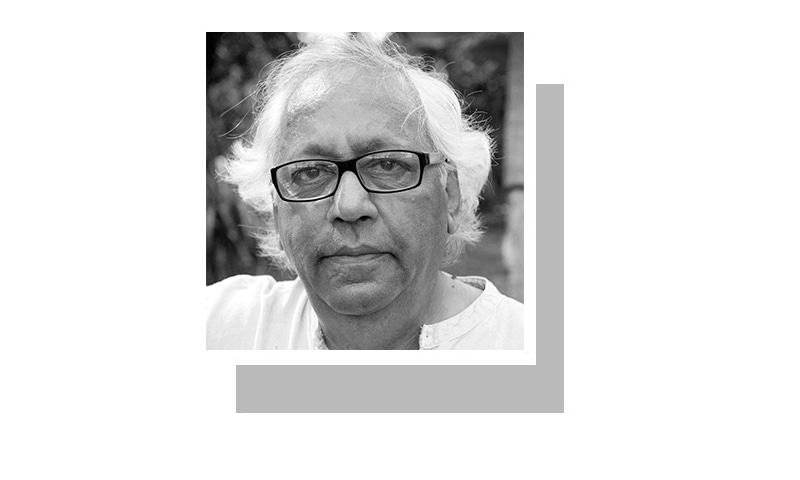
IT is amazing how quickly a terrorist atrocity can concentrate minds in Pakistan. But not for very long, sadly. The recent slaughter of over 70 at a Quetta hospital is a case in point. The long dormant National Action Plan — cobbled together after the December 2014 atrocity at the Army Public School in Peshawar — was dusted off. To oversee its implementation, retired Gen Nasser Janjua was pressed into service, and yet another committee formed under him.
But the problem is not a shortage of committees: we already have the National Counter-Terrorism Authority, or Nacta. In addition, no less than 15 committees were set up to monitor different aspects of NAP, with the interior minister chairing 11 of them.
The entire exercise represents the classic ‘death by committee’: when the bureaucracy wants to avoid action, it sets up a committee. Action appears to have been taken, and soon the public forgets all about the issue until the next crisis when yet another committee is established.
As Mr Janjua will be reporting directly to the prime minister, the interior minister’s role will be much diminished. And about time too. His contribution in the fight against terrorism has been abysmal, as pointed out recently by Zahid Hussain in his column. He has fought tooth and nail against going after the jihadi hideouts in Punjab, and has proved an abject failure in coordinating intelligence as called for in NAP. But his biggest failing has been in the areas concerning the ideological aspects of terrorism. Under NAP, all madressahs were to be registered and regulated; hate speech was to be halted; a dedicated anti-terror force established; banned organisations were to be prevented from re-emerging under different names; financing for terror networks was to be choked off; administrative reforms in Fata were to be carried out; there was supposed to be zero tolerance for militancy in Punjab; curricula were to be reviewed to remove extremist content; and the criminal justice system was to be revamped and reformed.
Over a year and a half after these ringing declarations were approved by almost all political parties and incorporated into NAP, none have been implemented. Small wonder, then, that Gen Raheel Sharif recently vented his dissatisfaction over the non-implementation of NAP publicly. With hundreds of soldiers dying in the war against a deadly foe, the military is justified in voicing its frustration over politicians dragging their feet.
When bureaucracy wants to avoid action, it sets up committees.
The point is that simply killing jihadis is not going to solve the problem: as we have seen, there is no shortage of recruits for the jihad. The battle has to be fought in classrooms, courtrooms, and the traditional and social media. But thus far, Nisar Ali Khan has failed utterly to make any headway in any of these crucial areas.
In other countries, terrorist atrocities have galvanised governments and the public into passing and implementing tough new laws. In the US, a Homeland Security department was created after 9/11 to coordinate intelligence and law-enforcement agencies. The slightest suspicion of support or sympathy for Islamic extremism was enough to trigger a quick response. Although some Muslims were unfairly targeted, society decided there was to be zero tolerance for terrorism.
In Pakistan, political considerations have compounded the usual apathy. Basically, the ruling PML-N does not want to antagonise the clergy and the fundamentalists by cracking down on madressahs, the reactionary media and the breeding grounds of jihad in Punjab. Facing a challenge from Imran Khan on the right, Nawaz Sharif is quite willing to kick the ball into the tall grass and avoid taking the tough decisions.
We all remember his brother Shahbaz Sharif plaintively pleading with the Taliban to leave Punjab alone. And to an extent, this strategy has worked: apart from attacks in the province on Ahmadis, Christians and Shias, the militants have largely targeted KP, Karachi and Quetta.
To be fair, taking on the religious right is not easy in a country that has seen a post-Zia generation grow up in an environment of increasing intolerance and religiosity. Many have been radicalised. Upwards of 25,000 madressahs churn out graduates who are unequipped to get jobs in today’s complex world. And a poorly informed and hysterical electronic media, in a hunt for audience share and advertising, constantly misguides millions.
Even Musharraf backed down soon after he announced that he would make Pakistan a moderate country. Needing the religious right to support him politically, he had to wash his hands off the secular, Kemalist ideals he said he admired when he first seized power.
Perhaps a bigger, more systemic problem lies in Pakistan’s birth: when we create a state in the name of a faith, we should not be surprised when its most extreme elements come to dominate the public discourse. After decades of brainwashing, most Pakistanis are convinced that Jinnah conceived the new country as an Islamic state. And good luck with convincing them that Jinnah was a staunch secularist.
Published in Dawn, August 20th, 2016































